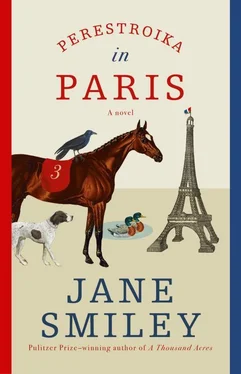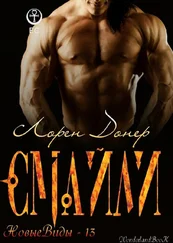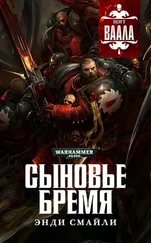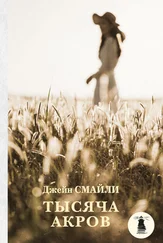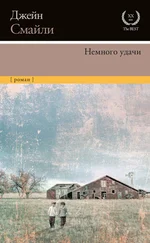And so she shook her head, extended her foreleg to lever herself to her feet, saw that it was light though the sun wasn’t up yet, the perfect time for a meal—she would climb the step, tap the door, perhaps. She rose. She stretched forward. She stretched backward. There was a breeze. She tossed her head. And now the door opened and Étienne came outside, stumbling over the bag as he did. He said, “Hey! What is this?” He lifted the bag and looked at it, then looked inside it, then went to the gate, which he saw was open, and looked down the street. Paras could see that he had no idea that the bag was from Frida. But it made him happy—that was evident. He turned, and said, “Grandmama! Grandmama! Father Christmas has made a visit!” He laughed and went back into the house, leaving the door open. Paras glanced over at Frida, who was now awake. She tossed her head toward the door, said, “Come in with me! Come on! It’s warm in there! You’ll enjoy it!”
But Frida trembled and curled up even more tightly. Jail!
Paras thought Frida might never enter the building. She snorted, went up the step and into the grand salon.
Étienne took Paras straight to the cuisine, where he had already filled her bowl with apples, carrots, and a pear. He petted her on the neck, rested his head against her shoulder. He seemed happier than Paras had ever seen him. Over and over, he said, “Merry Christmas, Merry Christmas, my dear! What a Merry Christmas this one is!”
Part Two

New Year’s passed pleasantly—Étienne managed to make some crêpes for Madame, sprinkled with demerara sugar (and for Paras, and for Kurt, and even for Conrad, who was lurking in his tunnel near the stove). Madame’s birthday came and went; she thought of it all day, but didn’t say a word about it to Étienne. She knew he knew she was old, but she didn’t want him to put a number to it. That was her main concern, vanity, until she lay down in her bed at the end of the day and her real concern hit her—yes, she wasn’t going to live forever, and what in the world would happen to Étienne? If she lived to be a hundred, he would be twelve when she passed, and although he might see himself as independent, no one else would, nor should they. She knew she had funds that had been accumulating for all of her life, but, legally, he might have no access to those funds (how might she find out about this?). The funds themselves would lead the authorities to hand him over to a trustee or (God forbid, remembering her youth) an institution. What had she been thinking? She imagined this room, her room, in this sturdy building. Well, she had been thinking of how her home had protected her for her whole life, and as a result, she had failed, even when she could see, to look out the window at the large world. She tossed and turned all night, ruminating on these things, and in the morning, when he brought her cup of tea and croissant, she patted the bed, put her hand on his arm, got him to sit down. She couldn’t see him, but she sensed his mood—lively, expectant, happy. She didn’t want to wreck that, and so she made up her mind that she would come up with something soon, and said, for now, only, “Ah, my dear, you are very kind.” He jumped up and hurried out of the room.
After giving his great-grandmama her tea and her croissant, wondering for a moment why she looked so worried, and then hurrying to the grand salon, Étienne went straight to Paras, who was lying on the carpet. As big as she was, she was careful in the grand salon, and graceful. She walked about, took naps, went to the cuisine, nudged the handle of the faucet for a drink of water if she was thirsty (and then nudged it until the water stopped running). Yes, having a horse was a lot of work. Even though the horse was pretty good about saving her deposits for outside (Étienne quickly learned that if she tapped the door he had to act at once), she ate far more than either he or his great-grandmama did—she was making her way through many stored root vegetables, dried legumes, fruits, and fresh vegetables. She would be expensive once the provisions in the cellar gave out. However, that would be sometime in the future, and Étienne knew that his future must include some very bad things—such as school, such as his great-grandmama’s passing on. Indeed, his future was a yawning chasm of loss and mystery that he didn’t dare look into.
This present—attending to the horse, petting her—was so enjoyable that he decided once again not to think about those things. Étienne often read while leaning his back against her as she rested. He liked to rub her with a cloth and brush her with an old hairbrush he’d found in one of the rooms upstairs. Lately, he had been sitting astride Paras as she curled upright on the carpet, her back hooves tucked neatly against her belly. She didn’t mind—she yawned, then she looked at him. He could imagine riding—the horse’s neck and ears in front of you, your hands entwined in her mane—but it was scary. Right now, his toes touched the carpet; everything was quiet; there was nothing scary about it. After a while, he “dismounted” (a word he had read in the riding manuals), and she stretched out on her side. He perched himself across her ribs then sat quietly on her hip. But even as he did so, he knew that he really wanted to ride.

WHEN ÉTIENNE WAS asleep or in the library or taking care of the old lady, Kurt sat on Paras, too. In fact, he ran all over her, snaking under her mane, trotting across her shoulder, scrambling up her leg from her hoof to her elbow. She liked it—it gave her a good scratching, and meant that she didn’t have to roll to take care of an itch. When Kurt asked her if she had ever had a rat as a friend before, Paras said, “Assassin wouldn’t allow it.”
“Who is Assassin?”
“A Jack Russell terrier.”
Kurt thought she said, “Jack Russell terror.” And, indeed, when she described the pleasure the dog always took in chasing rats, grabbing them, snapping their necks, he felt terror. Paras said, “He didn’t eat them,” as if that was a good thing. Why would he kill them, then?
“For sport. He enjoyed it.”
He sounded to Kurt like a cat, but, then, you didn’t get that feeling with a cat, that the cat was killing something because she enjoyed it—it was a duty for a cat, the essence of catness, to kill things.
Paras said, “Some of the horses were afraid of rats—not so much the sight of them as the sound of them. Horses don’t like mysterious sounds. But rats were fine with the rest of us. However, it wasn’t our business.”
While they were having this conversation, Paras was in the cuisine, eating her chopped beets from a bowl Étienne had placed in the seat of a chair, and Kurt was sitting on the back of the chair. When Paras was finished, Kurt scurried down into the bowl and disposed of the scraps. Paras said, “You know where I need a little scratch?”
Kurt looked at her, his mouth full.
“Under my mane, just behind my ears.” She stretched her head toward him and closed her eyes. He stepped lightly onto her maxilla and eased upward. When he got to her ears, he went a step farther, turned around, then entangled his back feet in the thick brush of her mane. She raised her head. It was disorienting, but Kurt held on. Paras said, “Ah, that feels good. I miss grooming. At the time, I thought there was too much of it, especially the everlasting baths, the water spraying in your face, but I liked the brushing.”
Читать дальше
